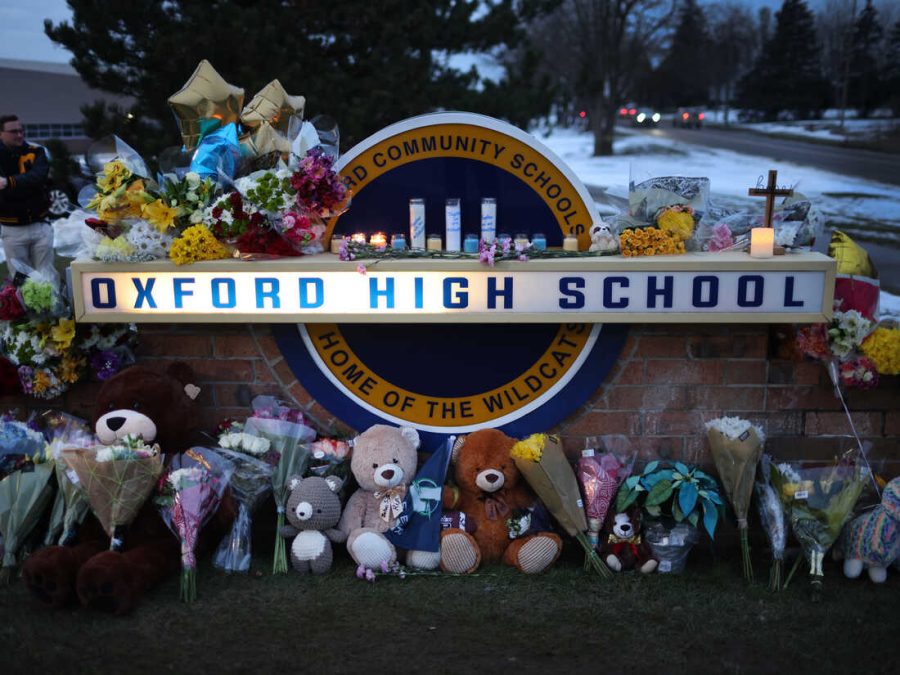Oblivious or implicit?: Should parents be charged in school shootings?
Image Courtesy of NPR
February 16, 2022
We all remember our favorite Christmas gifts, whether it be your first Barbie, iPhone, or coveted video game console. Well, for the Oxford school shooter, it might have been the 9mm Sig Sauer SP 2022 pistol he received from his parents. This same “early Christmas gift” would be used to gun down four teenagers and critically injure many others on Nov. 30. However, charges would be brought on not only the gunman, but his two parents as well. And rightfully so.
James and Jennifer Crumbly, the parents of the Oxford Shooter, do bear some responsibility for this tragedy. They neglected basic gun safety guidelines and ignored obvious warning signs in their child’s mental health. And while they did not pull the trigger themselves, they disregarded any opportunity to prevent this shooting.
Normally, parents don’t lock up Christmas gifts, unless they’re trying to channel Miss Hannigan from Annie. But, when that gift is a firearm, it should be locked away from any household children. This wasn’t the case with the Crumbly family, who kept the weapon stored in an unlocked dresser. The gun technically belonged to the parents, so under law it would be their responsibility to stow the firearm securely, right? Not in Michigan, a state with no CAP laws whatsoever.
CAPs, also known as Child Access Prevention laws, are meant to protect children from gaining access to firearms. Twenty-nine states currently have this law, although the specifics vary from state-to-state. According to the Rand Corporation, a research non-profit, these laws “may decrease rates of suicide, unintentional deaths, and violent crime.” Under this legislation, parents can be easily charged if their child gets into the family’s firearms. However, this is not the case in the 21 states without CAP laws.
This is what makes prosecuting the Crumblys such a slippery slope. Prosecutors are struggling to find legal footing in this case, even though it’s obvious who’s to blame. Besides just the sorry excuse for gun storage, the parents also ignored the most blatant warning signs. During court arguments over the Crumblys’ bond, Oakland County Prosecutor Karen McDonald alleged that the shooter had a history of torturing animals.
“Their son was torturing animals, even leaving a baby bird’s head in a jar on his bedroom floor, which he later took and placed in a school bathroom,” an official court filing reads.
The shooter was also displaying immense signs of emotional turmoil, which involved writing disturbing text messages to his mother and penning haunting journal entries.
However, one should cut the parents some slack. After all, it’s hard to pay attention to your child when you’re also juggling affairs, substance abuse, financial ruin, and most importantly, raising horses. According to the same court filing, the Crumblys are accused of being away from home 3-4 nights a week to attend to their stable of horses.
Now, most people are not licensed parenting professionals. But the majority would believe that the best help would be from a therapist or simply more parental presence. The Crumblys, however, took a different route and bought their son a 9mm pistol as an early Christmas gift. This eventually led to the shooter online shopping for ammunition on school grounds and further fantasizing on ideas of violence. Both of these troubling behaviors were dismissed by the parents, with Ms. Crumbly taking the opportunity for an important life lesson, although an unexpected one.
“LOL I’m not mad at you,” Jennifer Crumbly texted her son the Monday before the shooting, while ignoring calls from school officials, “You have to learn not to get caught.”
Her tone seemed to change the morning of the shooting, though.
“Ethan, don’t do it,” she pleaded to her son. Sadly, however, it was too little too late. Her son had already opened fire on a school of innocent students, determined to make his fantasies a reality.
There are many cases just like this one. According to the Washington Post, 80% of school shootings were a result of weapons taken from the child’s household. Parents are rarely charged, however, due to the lack of CAP laws. It is clear that without easy access to firearms, as facilitated by parents in most cases, school shootings wouldn’t be the commonality they are today.
Going forward, hopefully this case will be a wake-up call for states and prosecutors alike. There are too many circumstances where parents hold blame, but are not punished. Solving the issue of school shootings is complicated, but reducing children’s access to firearms in the first place is a reasonable start.



